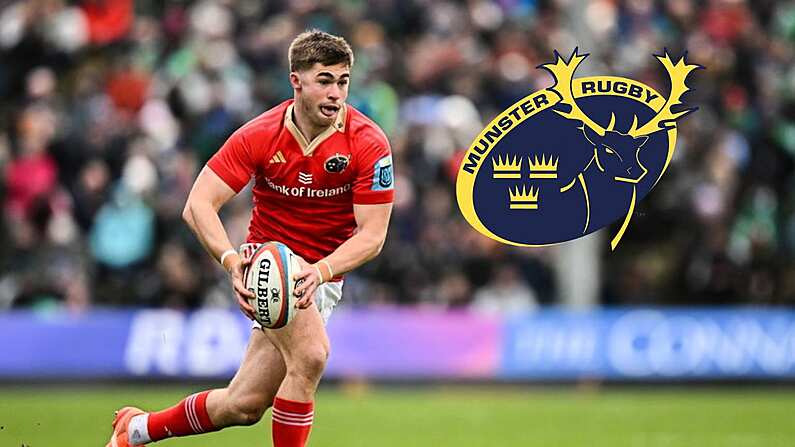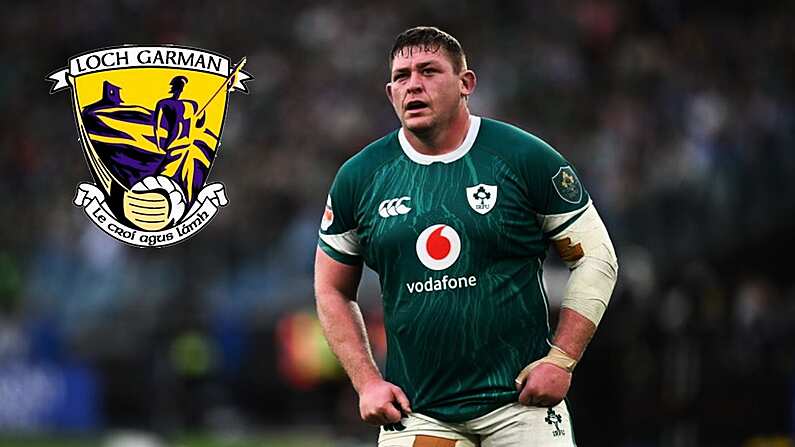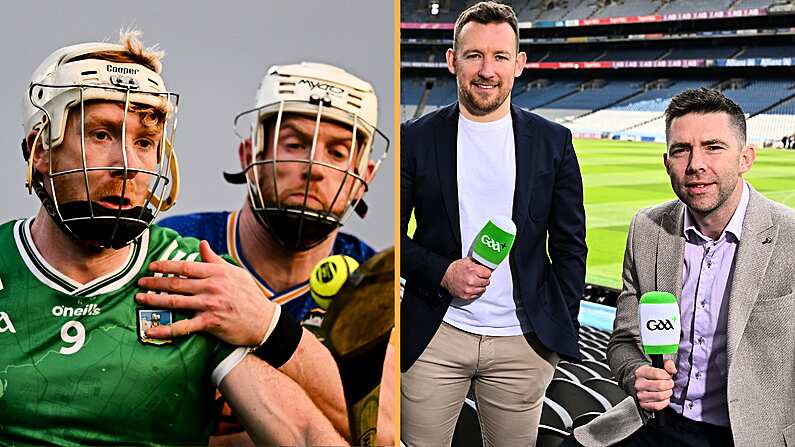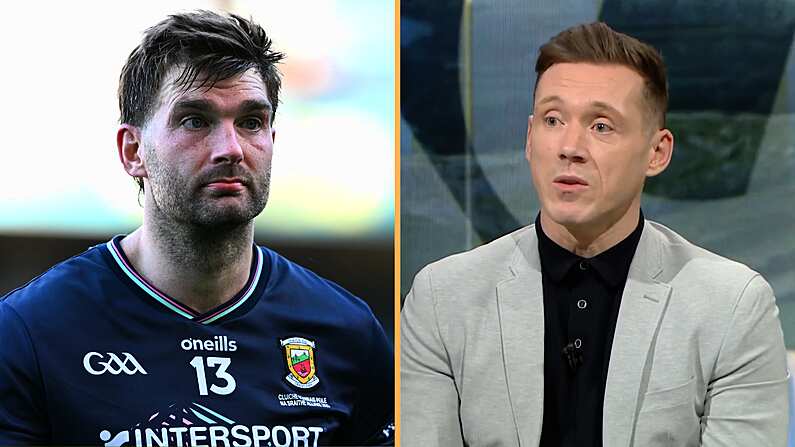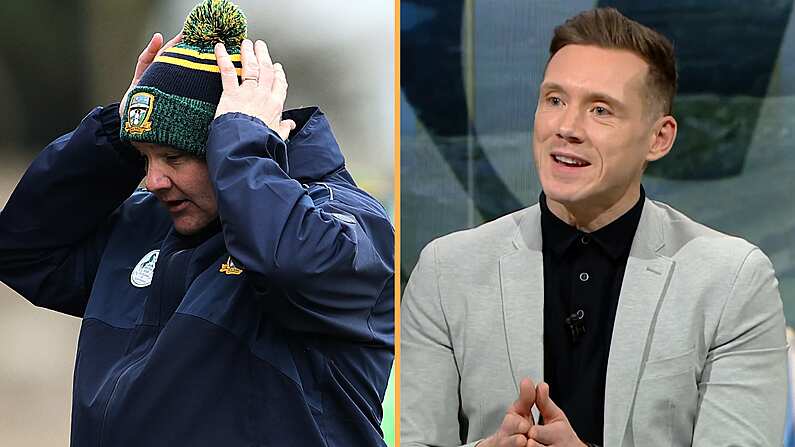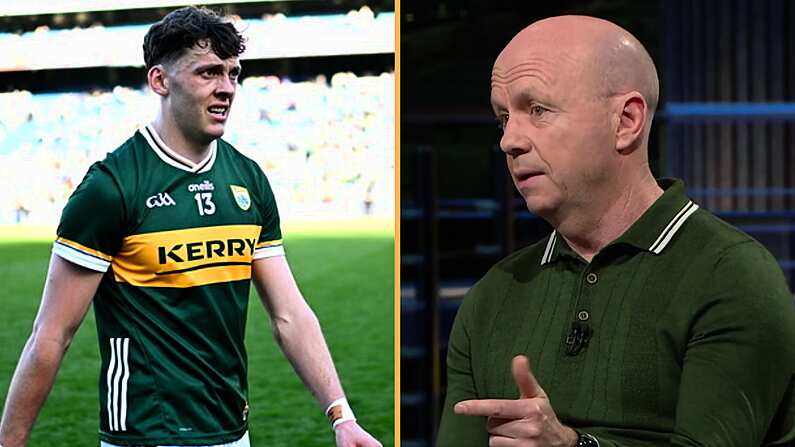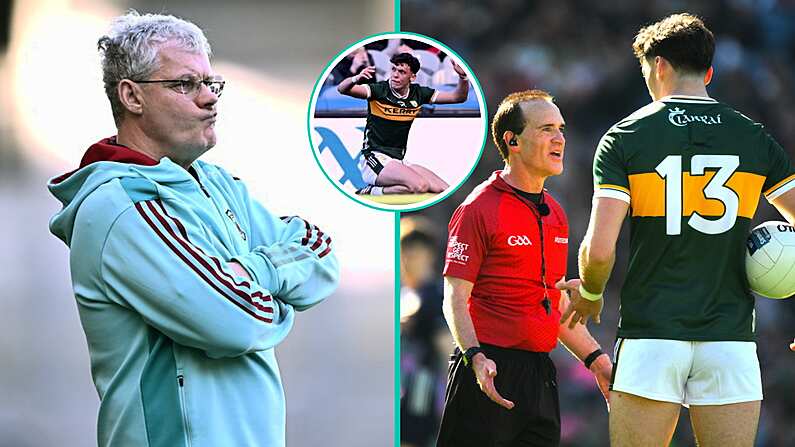In 1979, the Sugarhill Gang released their immensely catchy rap ballad ‘Rapper’s Delight’ a 15-minute long track that propelled rap music into the mainstream. It was the first commercially successful record of this kind and a defining moment in the evolution of music’s most socially significant genre.
This song forms the beginning of American Journalist Shea Serrano’s exceptional novel ‘The Rap Year Book’, a 236-page bestseller that identifies the most important rap song from 1979 to 2014.
When Jean-Jacques Rousseau said that ‘true enjoyment cannot be described’ he could well have been talking about the 2018 Hurling Championship. 55 games and 1,500 points later, the tournament has reduced the term ‘classic’ to an overused platitude. How did we arrive here? What series of events and matches unfolded to ultimately produce a championship for the ages? In the same spirit as Serrano’s effort, a Hurling Year Book is necessary.
In lieu of that, here is a comprehensive list of those pivotal matches. The point of this project is to identify the most important hurling match in each Championship from 2002 to 2018. To be clear, the most important does not imply the best, although they can overlap. For example, the 2004 Munster Final was the best game of that year, but also crucial in what it meant for both counties.
2002 is the designated starting point for two primary reasons. Firstly, the back-door system was expanded to involve teams beaten in the early stages of the provincial series of games that year. Furthermore, a project as wide-reaching as this one requires somewhat of a designated restraint.
For the purposes of this list, the ‘most important’ can be defined as the game that had the greatest implications for the sport, its dynasties, tactics, evolution and importance.
2002: Waterford 1-16 – 1-15 Cork, Munster Semi-Final
Why it was important: Rebellion(s)
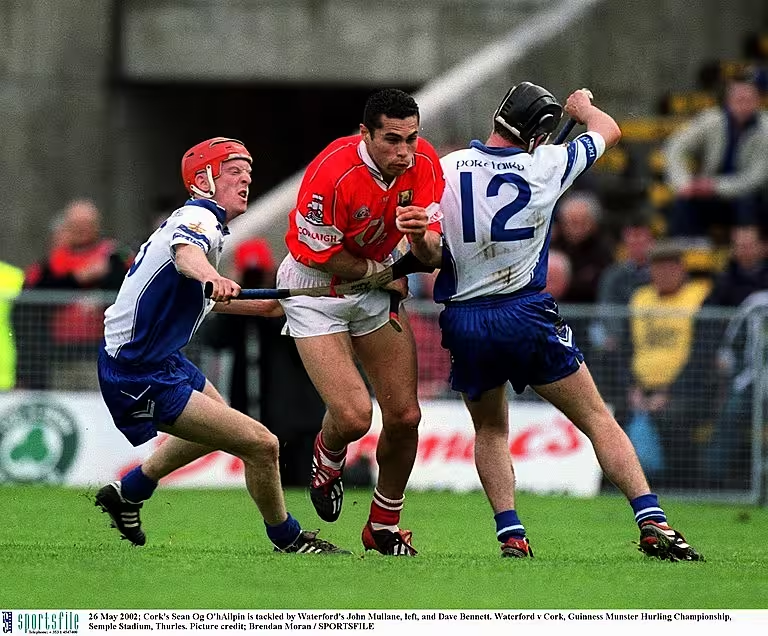
In a competition as selective as the Hurling Championship, the importance of a strong Waterford Cork rivalry is obvious. This was The Déise’s first win over Cork in 13 years, which is significant, but beyond that this game carried far greater importance. In the post-mortem of Cork’s loss grumblings about unease within the team that would ultimately lead to an unprecedented controversy.
For Waterford, it was their first game under former Cork manager Justin McCarthy and the fruition of his return to an old-school approach. McCarthy prioritised skill-work over the then in vogue hard running training. It provided the platform that would see them emerge as a true powerhouse in Munster hurling.
There were two player-concerned controversies stemming from this match. The first was Waterford’s refusal to adhere to the newly introduced drug testing protocol. Ultimately two players did provide samples, although it was reportedly outside the 90-minute limit. The initial snub was due to the players' insistence they were not ‘fully informed on the question of drug testing.’ Meanwhile, Cork’s panel were far from content in their own dressing room.
Sean Moran’s match report wrote of a ‘subdued’ Cork team, their manager Bertie Og Murphy was philosophical in his post-match interview and a few months later he stood down after just a year in charge. ‘Something wasn't right in the camp’ declared Jackie Cahill, in the Daily Mirror.
Cork were subsequently dumped out in the qualifiers against Galway. Then, on the same night as the All-Stars banquet, the situation came to a head when all 30 members of the Cork panel withdrew their services from the county in protest at the facilities and welfare concerns. It was drastic action but ultimately a landmark decision in the relationship between players and county boards. Henry Shefflin later hailed their courage and what it meant for the role of players in the association.
2003: Cork 2-20 - 3-17 Wexford, All-Ireland Semi-Final
Why it was important: Sponsorship

A game that stoked national debate, not so much for what happened on the pitch as what happened on the hurleys. Three players used sticks bearing Paddy Power logos after being offered €750 by the bookmaker. It infuriated GAA president Sean Kelly who immediately sought the severance of a three-year deal with the company, tested GAA/GPA relations and led to a fraught GAA/bookmaker relationship. Last year, all gambling sponsorship was banned.
2004: Waterford 3-16 - 1-21 Cork, Munster Final
Why it was important: 'Butter in freezers'

Two weeks before the 2004 Munster Final, Donal O'Grady sprung a surprise when he called Garvan McCarthy into the squad. He got his just reward when McCarthy scored a goal inside the first three minutes. A game that is widely renowned as the greatest hurling contest to take place outside of Croke Park, it was particularly significant stepping stone for Waterford's rise, as captain Ken McGrath described in his autobiography: "Every county needs a game like that 2004 Munster final now and again, something to get the blood pumping and to make lads stand up straight."
This was the game that converted the iconic John Mullane into a national figure. The Waterford corner forward was sent off shortly after half-time but returned to the field to celebrate in the aftermath: "I love this county so much. I'm delighted the lads did for the people of Waterford today" he told RTE Sport, as maniac Waterford fans vigorously patted his back.
As for Cork, even now McCarthy admits it was a crossroads. Things changed after that.
It was a turning point, we moved up a gear after. We’d lost the final the year before and it just got us to up a gear, players and management. I’ll give you an example, after it, during team meals they brought a freezer full of butter. Their own stuff. We sat down for the meal and Donal O’Grady went around and took up the butter and gave out this low-fat stuff. It was that fine.
It focused the mind. The media, the team came in for huge criticism which we all thought was hugely underserved. We thought it came out of nowhere. It was a puck of a ball, there was a bit of a media blackout then. We let them know our feelings in that respect.
Cork would go on to win the All-Ireland.
2005: Galway 5-18 - 4-18 Kilkenny, All-Ireland Semi-Final
Why it was important: Vengence

The final pairing of Galway and Limerick ensures this is the longest gap between All-Ireland titles that Kilkenny have endured this century. In 2005, defeat against Galway condemned them to similar faith as it was the second successive year they failed to win the Liam McCarthy.
At full-back that day was Tony Og Regan and in hindsight, he is painfully aware of that game’s significance. Galway poked the bear and the bear would soon bite back, storming to an extraordinary four-in-a-row from 2006 on.
Us beating them in '05 seemed to kick-start them for the next three or four years again. They just had an edge and a hunger after that for every game they played in league or championship. They wanted to beat teams by ten or fifteen points. They became so ruthless.
(after that) Kilkenny were thirsty for blood.
2006: Kilkenny 1-16 - 1-13 Cork, All-Ireland Final
Why it was important: The Beginning

Cork's quest for a three-in-a-row was thwarted by their heavyweight rival. "It was just hunger for the ball that drove us" explained Henry Shefflin afterward, a hunger that would maintain them for four fruitful years.
2007: Wexford 3-10 - 1-14 Tipperary, All-Ireland Quarter Final
Why it was important: Player power

“Half-time. In the dressing room, Babs let the players have it, telling them they were a disgrace and that if they were beaten today it would be their fault.”
Brendan Cummins, Standing my Ground, The Autobiography.
A shock defeat was an obvious knell that Michael ‘Babs’ Keating disastrous second reign as Tipp boss was over. Prior to the game, Keating dropped Brendan Cummins, who almost retired due to management’s treatment of him. Eoin Kelly was the county's top scorer of all time and an All-Star in 2001, ’02, ’04, ’05 and ’06. He was also dropped with Keating publicly criticising his ‘fitness.’
It was explicitly clear that the players had enough of Babs, and he walked before he was pushed shortly after. “The more Babs criticised us in public the more we became a shambles. Why we put up with it for so long is another story” wrote Lar Corbett in his autobiography. He was concerned that club training was a better quality than county. If 2002 was the first exhibition of player power, this was a further onslaught. A new era, one where managers outdated methods were challenged rather than accepted by players. A year later, Ger Loughnane would depart Galway in similar circumstances.
As for Tipperary, Keating was replaced by Liam Sheedy, who would set in motion the framework for a monumental All-Ireland Title in 2010.
2008: Kilkenny 3-30 - 1-13 Waterford, All-Ireland Final
Why it was important: The iron fist

"We wanted to beat the shite out of everyone. We wanted to embarrass players. To mentally dominate them. A common phrase in our dressing room was, 'Let's put hurling out of these fellas' heads for a long time.' That basically translated into, 'Let's psychologically scar these fuckers so much that when they come up against us in the championship, they'll run from us.' We had the mentality of assassins... When we met Waterford in the 2008 All-Ireland final, we put hurling out of the heads of some players for a long time."
Jackie Tyrell, The Warrior Code: My autobiography.
Peak Kilkenny.
2009: Kilkenny 2-18 - 0-18 Dublin, Leinster Final
Why it was important: Sweepers

Political scientist Ivan Arreguin-Toft considered the total of all the wars over the past two hundred years between very large and very small countries. 71.5% of the time, the bigger country wins. However, when the smaller country refused to engage on traditional terms and used unconventional or guerrilla tactics, they won 63.6% of the time.
In 2009, Anthony Daly's Dublin rebuffed traditional formats. A system he first employed in 2004 with Clare was utilised against a devastating Kilkenny team. Johnny McCaffrey played as a sweeper behind Joey Boland. Galway had experimented with a third midfielder in the '80s, Gaelic football was familiar with it but Daly broke new ground with regard to the small ball. Massive underdogs, Dublin finished within six points of the reigning All-Ireland champions. To put that in context, Kilkenny had won the Leinster final by 18 and 19 points in the two years previous.
Daly's decision was bold but categorically proved that the sweeper could work. Soon teams would start challenging for All-Irelands using one.
2010: Tipperary 4-17 - 1-18 Kilkenny, All-Ireland Final
Why it was important: The impasse

Henry Shefflin's cruciate injury formed a bizarre backdrop to a landmark moment in hurling history. Kilkenny's drive for five, felled at the final hurdle thanks to a devastating Lar Corbett hat-trick.
2011: Limerick 3-22 - 0-12 Antrim, All-Ireland Preliminary Quarter-Final
Why it was important: Narrowing confines

A contentious selection, but any revision of the development of hurling must touch on the failure to expand the game in any meaningful sense. For all the promise, Ulster hurling has never been as destitute.
Shortly after assuming the role of Antrim manager, Dinny Cahill vowed in front of a bemused press pack that 2004 was Antrim's year: "We are going to win the All-Ireland this year! We can win the All-Ireland." From there they went into terminal decline. He stood down in 2011 after a 19-point hammering against Limerick.
Speaking of Limerick, this was the last game they won in 2011 but the consequences of that were huge. The ill-fated Justin McCarthy era was put to bed and Donal O'Grady brought an air of professionalism that had been sorely missed. That year an underage academy was also established. The effect of that is evident today.
2012: Galway 2–13 – 0–19 Kilkenny, All-Ireland Final
Why it was important: Motivation

"I’m kind of sick of hearing about a great year in 2012. We didn’t win the All-Ireland. We demand more of ourselves every day."
Joe Canning, 2015.
This was a draw that did as much for Galway as it did Kilkenny. In the short-term, Kilkenny leaped on fairly innocuous remarks by Joe Canning about Henry Shefflin running 30 or 40 yards to remonstrate with the referee. Canning also revealed JJ Delaney was not impressed by Shefflin's decision to take a point when awarded a 21 metre free. The outrage was widespread and Shefflin would later reveal in his autobiography that it propelled him to seek revenge - "I'll shove these words down Galway throats"- while Richie Hogan brought it up in a team meeting before the replay. As for Canning, he held on to that missed opportunity and put it right in 2017.
2013: Clare 1-23 - 2-14 Galway, All-Ireland Quarter-Final
Why it was important: Belief

2013's two All-Ireland finals were space-age absurdity, but Clare's journey begun long before then. Even now, All-Ireland winning Clare star Darach Honan is in little doubt at the impact a victory over 2012 All-Ireland finalists Galway had.
Once we had won that game I really felt like anything was possible after that and we fancied ourselves against any of the remaining teams.
2014: Kilkenny 3-22 - 1-28 Tipperary, All-Ireland Final
Why it was important: The shoot-out

Ths match heralded the genesis of modern-day epic shoot-outs defined by point taking rather than goals. A scarcely believable 20 different scorers from play.
2015: Galway 2-28 – 0-22 Cork, All-Ireland Quarter-Final
Why it was important: A glimpse of what was to be

When Anthony Cunningham's side took to the Semple Stadium pitch prior to the 2015 Quarter Final, there were noticeable murmurs in the press box. This was a physically imposing team. In 2015 Galway would once again fall at the final hurdle but on the 26 July they showed a glimpse of what was coming down the tracks, and they did so in the first sixty seconds when Johnny Glynn stormed trainlike through the centre of the Cork defense and smashed past Anthony Nash.
"It’s certainly been a long time since Joe Canning was either equalled or out-scored by three other Galway forwards," suggested Ian O'Riordan in the Irish Times, as a more versatile offensive unit raised its head. Glynn had a rather more blunt description of the supposed reliance on Canning: 'Fuckin' bullshit,' he told RTE.
2016: Kilkenny 2-20 – 2-29 Tipperary, All-Ireland Final
Why it was important: Swansong

They ruled the game with a ferocity reserved for sport's most dominant teams, but 5 September 2016 was unmistakably the end of an era. Kilkenny have failed to darken Croke Park's door on All-Ireland final day since.
2017: Galway 0-22 - 1-18 Tipperary, All-Ireland Semi-Final
Why it was important: Joe Shows

For the entirety of his Inter-county year, Joe Canning was scrutinised. Finally in 2017 Galway delivered and he was the man to drag them over the line.
2018: Cork 1-25 – 0-28 Limerick, Munster Championship Round Three
Why it was important: Hurling.

When a 14-man Limerick went toe-to-toe with defending Munster champions Cork in a brand new and jampacked Páirc Uí Chaoimh it simultaneously confirmed that this Limerick team are the real deal and this new round-robin works. Epic, thrilling, classic, all we have come to expect and love with sport. The superlatives were widespread and yet they were apt. Hope springs external for the final two today but the masses will be heartily fulfilled as a whole. 2018 was the summer anticipated for its weather but it will be remembered for its hurling.



